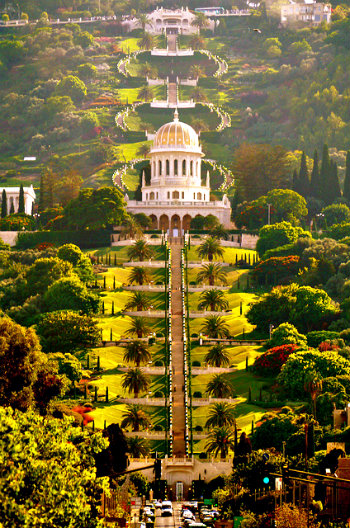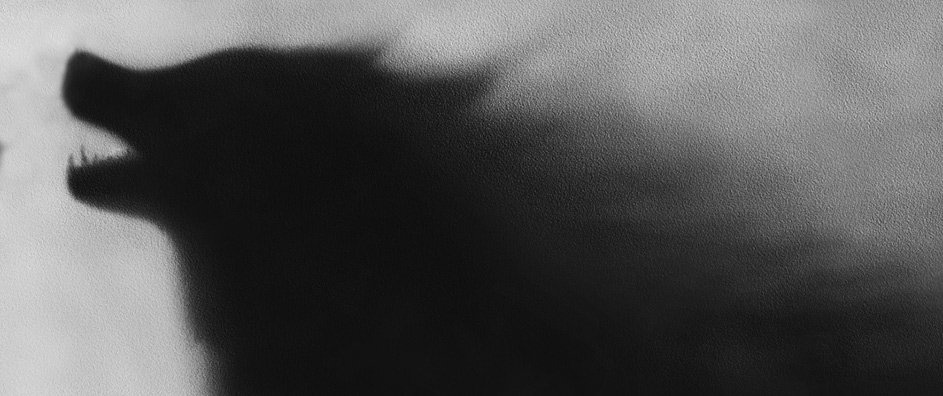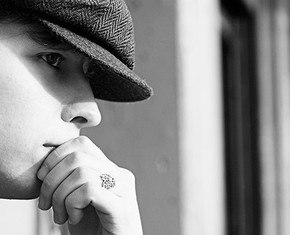The views expressed in our content reflect individual perspectives and do not represent the authoritative views of the Baha'i Faith.
During his later years Baha’u’llah made four trips to Haifa, the port city located across the bay from Akka.
In 1891 he visited the city for three months. One day, while on Mount Carmel, Baha’u’llah pointed to a spot on the mountainside and told his son Abdu’l-Baha that a mausoleum should be built on that site to contain the remains of the Bab.

The Shrine of the Bab sits atop Mt. Carmel where Baha’u’llah pointed in 1891.
At this time, the Bab’s remains and coffin had been hidden by the believers, carried from place to place, for over forty years. It would still be many years before Baha’u’llah’s request could be carried out, but it was eventually accomplished. Today the Shrine of the Bab, a beautiful, majestic, golden-domed edifice, stands on the very spot that Baha’u’llah indicated.
It is believed that during this same trip Baha’u’llah visited the Cave of Elijah, where a Christian monastery stands today. On a spot near the entrance of the cave, he revealed the Tablet of Carmel, one of his most beautiful and memorable writings. The tablet lauds in jubilant tones the Day in which God’s ancient promises are now fulfilled, extols the greatness of the new revelation, and, in poetic language, establishes Carmel itself as the world center of the Baha’i Faith.
At the time Baha’u’llah revealed the Tablet of Carmel he had a little less than a year remaining in his life. He spent the time revealing scripture with unabated energy, assuring friend and foe of the eventual triumph of God’s new faith.
Another significant work from this period was written to one of the fiercest enemies of the Baha’i Faith in Persia. Shaykh Muhammad-Taqi had been personally responsible for inflicting much suffering on the Baha’is in the city of Isfahan. His father had done the same before him, committing such cruel atrocities that Baha’u’llah had addressed him as “the Wolf.” Baha’u’llah wrote a volume, known as The Epistle to the Son of the Wolf, which stands as his own summation of his life’s work. In it he reveals his own perspective on the achievements of a four-decade ministry and sets forth his vision for the future of his faith.
Baha’u’llah, severely rebuking the son of the Wolf, called upon him to repent and seek God’s forgiveness for his injustices. Baha’u’llah then established the complete innocence of the persecuted Baha’is and repeated many of his own previous exhortations to the believers to avoid sedition and to lead upright lives. He vigorously denied accusations that he claimed to be God and, after recounting his own sufferings and those of his followers, forthrightly stated His purpose:
Briefly, this Wronged One hath, in the face of all that hath befallen Him at their hands, and all that hath been said of Him, endured patiently, and held His peace, inasmuch as it is Our purpose, through the loving providence of God—exalted be His glory—and His surpassing mercy, to abolish, through the force of Our utterance, all disputes, war, and bloodshed, from the face of the earth. Under all conditions We have, in spite of what they have said, endured with seemly patience, and have left them to God. – Baha’u’llah, Epistle to the Son of the Wolf, p. 34.
Baha’u’llah upbraided Shaykh Muhammad-Taqi and his father in strong terms for having passed judgment against him without having made adequate inquiry as to the true nature of his claims. Baha’u’llah recounted the history of the Baha’i community, which had clearly grown and prospered under his guidance and in spite of his enemies. He foretold that the shaykh and those like him would eventually lose their power and influence. He called upon him to “rend asunder the veils of idle fancies” and assured him that the Cause of God would triumph in the end:
This Cause is too evident to be obscured, and too conspicuous to be concealed. It shineth as the sun in its meridian glory. – Baha’u’llah, Epistle to the Son of the Wolf, p. 104.
Next: The Death—and Victory—of the Prophet
















Comments
Sign in or create an account
Continue with Googleor